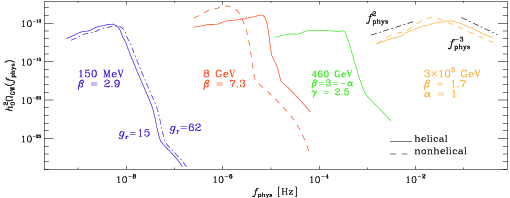Relic gravitational waves are believed to be produced in the very early universe, possibly already during inflation, the subsequent reheating phase when matter was produced, and also during the radiation-dominated era at cosmological phase transitions. Examples of those are the electroweak and the QCD phase transitions.

The figure above shows GW energy spectra (normalized by the critical energy density of the Universe) of recent numerical simulations of GW generation during low-energy scale reheating scenarios done at Nordita. Depending on the energy scale, the GW energy spectra are expected to peak at nano-Hertz frequencies (for QCD energy scale reheating) up to milli-Hertz (for energy scales on the order of nearly a million GeV).
Milli-Hertz GWs will be accessible to various planned space interferometers, while nano-Hertz GWs may already have been observed with the North Americal Pulsar Timing Array for Gravitational waves, NANOGrav. In the future, the Square Kilometer Array may measure many more pulsars. Even high accuracy astrometry may be used to detect the stochastic GW background.